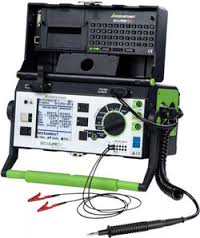Electrical Safety Testers For Electrical Equipment

Electrical safety testers are vital instruments used to verify that electrical equipment is safe to operate and compliant with safety standards in both the United States and Canada. These tools are essential for manufacturers, testing laboratories, and maintenance professionals to perform standardized safety tests before equipment reaches consumers. From verifying ground continuity to checking insulation integrity and operational performance, safety testers help reduce the risk of electric shock, fire, or equipment failure. In North America, compliance with national standards—such as those set by Underwriters Laboratories (UL) in the U.S. and the Canadian Standards Association (CSA) in Canada—is legally required for many types of electrical products. These standards ensure that safety testing methods align with the latest industry practices and government regulations.
Request a Free Training Quotation
Ground Continuity Testing: Protecting Users from Shock Hazards
The ground continuity test is one of the most fundamental tests performed using electrical safety test. This test ensures that the third prong of a grounded power cord in metal-cased devices effectively connects to the product’s chassis. If a fault occurs—such as a live wire touching the metal casing—this ground connection safely redirects current to earth, preventing the user from receiving an electric shock. Testers are especially important in Electrical Grounding Safety For Workers and Equipment to ensure installations are secure.
In both Canada and the United States, ground continuity is not optional. Standards such as CSA C22.2 and UL 61010 mandate verification of protective grounding in electrical appliances. Testers used for this purpose apply a small current (often around 25 A) and measure resistance. A typical acceptable resistance value is less than 0.1 ohms. Devices that fail to meet this criterion must be repaired or rejected before reaching the market.
Insulation Testing: Verifying Barriers Between Live Parts and the User
Electrical safety testers are also used to evaluate insulation effectiveness, a critical defense against electric shock and fire. These insulation tests ensure that the insulating materials separating conductors from exposed surfaces are strong enough to withstand normal and abnormal operating conditions.
There are three main types of insulation tests commonly used in the U.S. and Canadian markets:
- Dielectric Strength Test (Hi-Pot): This high-voltage test determines if an electrical product can endure voltage surges without breakdown. For example, a 1,500–3,000 voltage between live conductors and the case may be applied. A breakdown or arcing event indicates insulation failure, resulting in a failed test.
- Leakage Current Test: The product is energized under normal operating conditions, while current leaking to accessible parts is measured. Safety regulations in both Canada and the U.S. specify maximum allowable leakage currents—typically 0.5 to 5 mA, depending on device classification. Exceeding these levels may pose a risk of shock to users.
- Insulation Resistance Test: Often used in industrial applications such as motor maintenance or building wiring checks, this test measures resistance across insulating materials. While useful for diagnostics and maintenance, it’s not always applicable for consumer product safety certification.
Each of these tests is conducted using calibrated instruments compliant with standards like IEC 61010-1, which is harmonized with UL and CSA standards.
Operational Performance Testing: Ensuring Safe Functionality
Beyond grounding and insulation, electrical safety testers are employed to assess how a product performs under typical operating conditions. Operational tests look for signs of malfunction that could result in hazards, such as overheating, excessive current draw, or unexpected shutdowns.
For instance, power tools, kitchen appliances, or HVAC systems might undergo operational safety evaluations where testers monitor parameters like:
- Input current and power consumption
- Temperature rise during operation
- Motor speed or torque limits
Standards such as UL 60335-1 and CSA C22.2 No. 60335-1 guide these performance-based safety evaluations for household and similar electrical products. Operational testing ensures that even when a product is functioning as intended, it won’t become a hazard due to faulty components or poor design.
Testing for Trust and Safety
Electrical safety testers are indispensable in safeguarding users from electrical hazards. They also play a key role in routine Electrical Safety Procedures In The Workplace. Whether checking a ground wire’s integrity, evaluating insulation under high voltage, or confirming operational reliability, these tests provide the data needed to ensure equipment complies with safety standards in the United States and Canada. As technology evolves and standards continue to be updated—such as recent revisions to UL and CSA harmonized standards—electrical professionals must stay informed and use properly calibrated testers to maintain safety and compliance.
Arc Flash Group Training

We can present this Course to your electrical engineering and maintenance staff, on your premises, tailored to your specific equipment and requirements. We are ready to help design this program for you. Click on the link below to request a FREE quotation.
Live Online Electrical Training Schedule
October 2025
- Grounding and Bonding Training And The CE Code
- Combined CSA Z462 LV & HV Electrical Safety Training
- Arc Flash Training - CSA Z462 Electrical Safety
- High Voltage Safety Training
- NFPA 70e Training
- Substation Maintenance Training
November 2025
- Power Transformer Maintenance Training
- NFPA 70b Training - Electrical Maintenance
- Emergency Generators & Standby Power Systems
- 2024 CE Code - Changes and Fundamentals
- 2024 CE Code - Combined Course: Changes/Fundamentals and Calculations
- Lightning Protection Systems Training For Utility, Industrial, Commercial & Institutional power systems
